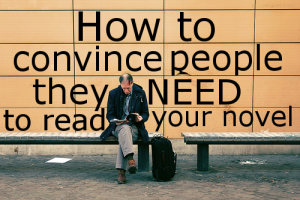
image by Proxy Indian
I was terrified. I was ecstatic. Sending my novel – my brainchild – out into the world for the first time. By “the world” I mean, to a few of my closest friends. My brother and best friend finished within a week. Probably due in part to a feeling of obligation. “It’s great!” they said, “Wouldn’t change a thing.”
Months went by. I checked in with my other best friend, who hadn’t gotten past chapter seven. “I’ve been busy,” she said. “That’s fine,” I said lightly, but felt hurt.
Years later, she (and the few others I sent that draft to) still haven’t finished reading it.
Oh, I was hurt for awhile. Angry. I distinctly remember telling some of them off in a forum message about eight months after that draft went out.
See, I had poured my soul out into that book. My soul. And my soul wasn’t interesting enough to even tempt the attention of my closest friends? I told myself the writing wasn’t the problem – after all, no one could tell me a thing that needed changing, aside from a typo or two. No, my friends just didn’t understand how important this was to me.
Awhile later, I realized chapter seven was possibly the worst combination of English words ever typed on paper, and I began a complete overhaul of the novel (one of countless overhauls). It occurred to me that the people close to me are naturally going to look at my book differently from one they’d pick up at Barnes & Noble – they’re not going to notice much wrong with it, specifically. But if they can’t finish it – that’s a sign it ain’t too good.
I started to realize that the problem was the writing, not my friends.
But I didn’t fully realize what that meant until a few years later, after I had been in marketing for awhile. You see, if an advertisement doesn’t get any attention, nobody blames the audience. It’s not a shortcoming of the product advertised, either – it’s a shortcoming of whoever created the ad.
If people aren’t reading your stuff, it’s not because your soul is boring.
It’s because your writing is boring.
There, I said it. Don’t get offended; I’m in the same boat.
It doesn’t mean we have to get depressed and self-deprecating. It just means we have to get better.
See, I discovered something copywriters use, that few aspiring novelist even think about.
Strategy.
An example: What do most novelists think about? Grammar. Punctuation. Plot. Character development. Poetic descriptions.
Copywriters, on the other hand, are asking: Who is the target audience? What part of my message will resonate with them on the deepest emotional level? What’s the quickest way I can convey that message? How can I grab their attention and keep their attention? How can I make them feel a certain way? How can I make them take action?
Funny how a lot of those questions could be applied to a novel, huh?
Oh, we’re told a lot of the same things copywriters are told. Show, don’t tell. Create relatable characters. Keep the action moving. But if you’re like me – if you’re experiencing the same kind of thing I described at the beginning of this post – you’re just not getting it. Not really.
So I propose this: we step back and look at our work from a different perspective. From a marketing perspective. In the next few weeks, I’ll share some of the things I’ve learned, some of the things I’m implementing in my own novel right now – all while digging deeper into how basic marketing principles can be applied to fiction. We’ll learn together.
You see, I want to write a novel that no one can put down.
Who’s with me?
—
UPDATE: READ THE WHOLE SERIES
Attention
Interest
Desire
Action






